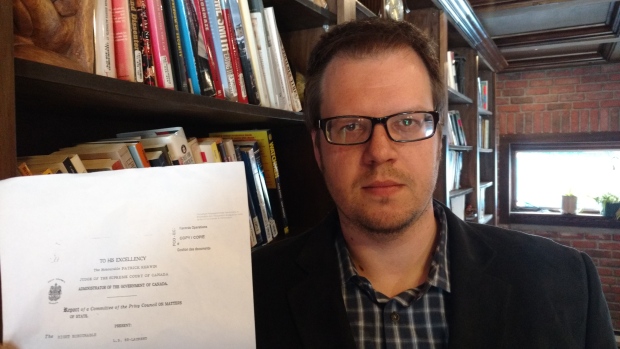Written by guest blogger, Dennis Molinaro.
*Dennis Molinaro’s upcoming article, “In the Field of Espionage, There’s No Such Thing as Peacetime”: The Official Secrets Act and the PICNIC Wiretapping Program”, will be available in the forthcoming issue of the Canadian Historical Review, Vol. 98, Issue 3 (2017).
 Author Dennis Molinaro whose article on The Official Secrets Act and the PICNIC Wiretapping Program will appear in the Canadian Historical Review Vol. 98, Issue 3 (2017)
Author Dennis Molinaro whose article on The Official Secrets Act and the PICNIC Wiretapping Program will appear in the Canadian Historical Review Vol. 98, Issue 3 (2017)Photo Credit: Marino J. Osso via the CBC
The history of intelligence and espionage in Canada is a field fraught with gaps in the historical record. One of the reasons for this is the lack of sources available. This article began with a search for an order-in-council that was never published, but like pulling on the thread of a sweater, it began leading to more discoveries including the revelation that millions of documents pertaining to intelligence history have yet to make their way to the public archive. This material isn’t just central to uncovering intelligence history in Canada, but Canadian and international history as a whole because the material could surely shed much more light on international relations and the Cold War broadly speaking. This article focuses on the secret construction of a wiretapping program known at the time as PICNIC.
This article began with a search for an order-in-council that was never published, but like pulling on the thread of a sweater, it began leading to more discoveries including the revelation that millions of documents pertaining to intelligence history have yet to make their way to the public archive.
While the program was initially limited to those suspected of disloyalty during the Korean War, the government wanted to secretly continue the program in peacetime, using the Official Secrets Act to provide the legal justification for it. This incident reveals that wiretapping done by the RCMP during the Cold War and before the McDonald Commission may not have been carried out in as ad hoc a way that was previously believed and instead this demonstrates that the federal government was aware of, and sanctioned, the use of wiretapping in counter-intelligence operations. At the same time this event helps us understand how security was understood in this period, and how it can function as an ideological construct. On the one hand this event reveals the early construction of a mass surveillance infrastructure, but it also reveals the early construction of an idea of what security was and what some believed was needed to be done to provide it.
Dennis Molinaro’s upcoming article, “In the Field of Espionage, There’s No Such Thing as Peacetime”: The Official Secrets Act and the PICNIC Wiretapping Program”, will be available in the forthcoming issue of the Canadian Historical Review, Vol. 98, Issue 3 (2017).
Comments on this entry are closed.